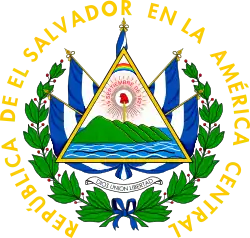El Salvador–United States relations
According to the 2012 U.S. Global Leadership Report, 55% of Salvadorans approve of U.S. leadership, with 19% disapproving and 26% uncertain, the fourth-highest rating for any surveyed country in the Americas.[1] In 2013 and 2014, according to the Pew Research Center's global attitudes survey 79% and 80% of Salvadorans viewed the United States positively respectively revealing El Salvador as one of the most pro-American nations in the world.[2]
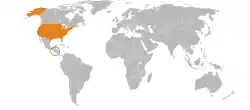 | |
El Salvador |
United States |
|---|---|
History
The history of U.S.-El Salvador relations encompasses some controversial moves and operations by the United States, e.g. the U.S.-involvement in the Salvadoran Civil War[3] and interference in Salvadoran elections, such as during the 2004 presidential election.[4][5]
On 10 June 2014, UNICEF reported a significant increase in the numbers of unaccompanied Salvadoran children seeking to enter the United States without their parents:
According to US Government statistics, over 47,000 unaccompanied children have been detained on the southwestern US border over the past eight months, almost double the number of children detained between October 2012 and September 2013. The United Nations High Commissioner for Refugees estimates that at least 10,000 additional children will attempt to enter the US without their parents before the end of September.[6]
On January 11, 2018, The Washington Post reported that, in a discussion protecting immigrants from El Salvador, Haiti, and African countries, Donald Trump asked, "Why are we having all these people from shithole countries come here?"[7] After the report was released, Trump denied on Twitter that he used the term, "shithole countries", but said that he used tough language in regards to the countries.[8] Meanwhile, a spokesperson for the United Nations condemned Trump's comment, describing it as "racist".[9] President Salvador Sanchez Ceren said that he "vigorously rejected" the comments that were attributed to Trump.[10]
Present
.jpg.webp)
U.S.-Salvadoran relations remain close and strong. U.S. policy towards the country promotes the strengthening of El Salvador's democratic institutions, rule of law, judicial reform, and civilian police; national reconciliation and reconstruction; and economic opportunity and growth. El Salvador has been a committed member of the coalition of nations fighting against terrorism and has sent 10 rotations of troops to Iraq to support Operation Iraqi Freedom.
U.S. ties to El Salvador are dynamic and growing. More than 19,000 American citizens live and work full-time in El Salvador. Most are private businesspersons and their families, but a small number of American citizen retirees have been drawn to El Salvador by favorable tax conditions. However, following the Salvadoran government's controversial decision to cut ties with Taiwan in favor of the People's Republic of China in August 2019, some Republican senators like Marco Rubio had demanded that economical aid to the country be cut and their expulsion from Alianza Para Prosperidad (a U.S-supported program to help El Salvador, Honduras and Guatemala with education and healthcare to reduce illegal immigration to the United States). The Embassy's consular section provides a full range of citizenship services to this community. The American Chamber of Commerce in El Salvador is located at World Trade Center, Torre 2, local No. 308, 89 Av. Nte. Col. Escalón.
Friendship Day between U.S. and El Salvador
On March 9, 2017, with 66 votes in favor, the Salvadoran Legislative Assembly approved the declaration of June 15 as “Friendship Day between El Salvador and United States.” The initiative was studied by the Committee for Cultural and Educational Affairs of the Legislative Assembly to commemorate the establishment of diplomatic relations between the two countries on June 15, 1863. The bilateral relations between the two countries have strengthened through joint programs and initiatives such as Partnership for Growth, the Millennium Challenge Corporation compacts (MCC) with El Salvador, known in El Salvador as FOMILENIO I and II, and the U.S. support to initiatives such as the Alliance for Prosperity. The “Friendship Day between the United States and El Salvador Decree” exemplifies the close bilateral relationship and aims to highlight the continued commitment to working together to improve safety and promote prosperity in El Salvador.[11]
Resident diplomatic missions
|
|
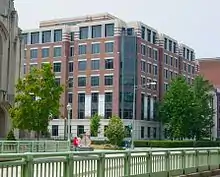 Building hosting the Embassy of El Salvador in Washington, D.C.
Building hosting the Embassy of El Salvador in Washington, D.C.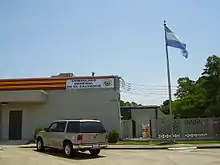 Consulate-General of El Salvador in Houston
Consulate-General of El Salvador in Houston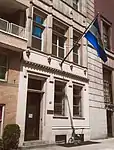 Consulate-General of El Salvador in New York City
Consulate-General of El Salvador in New York City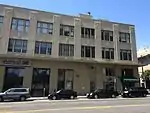 Consulate-General of El Salvador in San Francisco
Consulate-General of El Salvador in San Francisco
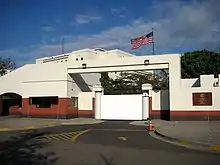 Embassy of the United States in San Salvador
Embassy of the United States in San Salvador
See also
References
- U.S. Global Leadership Project Report - 2012 Gallup
- Opinion of the United States - El Salvador Pew Research Center
- George Miller. "El Salvador: Policy of Deceit", The New York Times, October 21, 1988.
- "Dana Rohrabacher Speaks out on El Salvador Election, Clashes With Obama Administration". Archived from the original on 2011-06-03. Retrieved 2010-07-24.
- Seelke, Clare Ribando (November 20, 2018). El Salvador: Background and U.S. Relations. Washington, DC: Congressional Research Service. Retrieved 2 December 2018.
- UNICEF (2014-06-10). "Aumento impresionante del número de niños no acompañados que tratan de entrar en los Estados Unidos - El Salvador". ReliefWeb (in Spanish). Retrieved 2014-06-12.
- Dawsey, Josh (11 January 2018). "Trump derides protections for immigrants from 'shithole' countries". Washington Post. Retrieved January 12, 2018.
- Fram, Alan; Lemire, Jonathan (12 January 2018). "Trump denies he referred to Africa as a 'shithole'". Chicago Tribune. Retrieved 12 January 2018.
- Hjelmgaard, Kim (12 January 2018). "U.N., African countries blast Trump's 'racist' words in angry global backlash". USA TODAY. Retrieved 12 January 2018.
- "El Salvador foreign minister protests over Trump comments". Reuters. 12 January 2018. Retrieved 12 January 2018.
- "El Salvador approves "Friendship Day between U.S. and El Salvador" | U.S. Embassy in El Salvador". U.S. Embassy in El Salvador. 2017-03-10. Retrieved 2019-06-11.
![]() This article incorporates public domain material from U.S. Bilateral Relations Fact Sheets. United States Department of State.
This article incorporates public domain material from U.S. Bilateral Relations Fact Sheets. United States Department of State.
